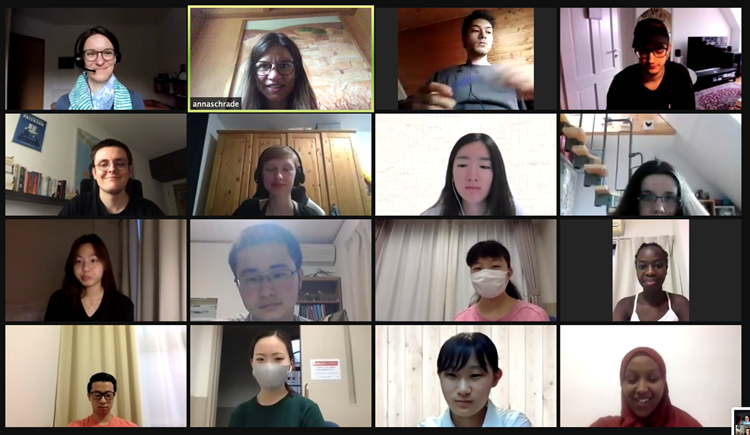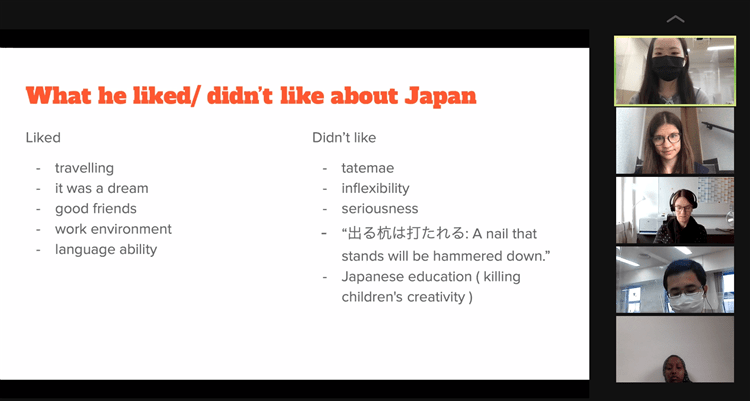- TOP
- Jean Monnet Activities
- News List
- News
- <Jean Monnet Module> Introducing ‘The European Union: History, Politics & Economy’ as COIL course
2021.07.29.
<Jean Monnet Module> Introducing ‘The European Union: History, Politics & Economy’ as COIL course

The European Union: History, Politics & Economy (School of International Studies)
Dr. Anna Schrade, Associate Professor, Institute for Industrial Research
How to make the best of the (unvoluntary) e-learning that all our students at KGU had to face in 2020 and 2021? COIL!
COIL stands for Collaborative Online International Learning. The name says it all: the main idea is that students from different universities across the globe study together online. In our case, we paired BA students from Kwansei Gakuin University (KGU) with MA students from LMU Munich (LMU). While their majors were rather different (the LMU lot were all Japanologists, while the KGU students, majoring in International Studies, focused on the EU), the system work out extremely well. This was because the main topic of this class, MIGRATION, offered so many great opportunities to be compared and contrasted.
In all our 14 sessions, the LMU group and the KGU group shared the same topic for the day. The only difference was that the German students analysed the topic at the example of Japan, while the students from KGU investigated the situation in the EU.
For the large majority of our classes, the students all convened on zoom for a ‘plenary’ session, where, after a short introduction to the topic, one LMU student gave a short presentation about the day’s topic at the example of Japan. We then quickly discussed the main points before separating into two groups. While the German students continued with their discussion, the KGU students met in the breakout room to work on the EU perspective. In our small group, I provided brief lectures on the topic, analysing EU labour mobility & migration from different angles, such as
- Labour migration in the care sector
- Labour migration in agriculture
- Highly-skilled migration
- Economic issues of migration
- Multiculturalism vs. assimilation
- Questions of belonging
- Civil society & migration
- Refugees & illegal migration
- Approaches to integration

Getting some insights about the situation in Japan at the beginning of the class really helped the students get a better grasp of the general situation and the current state in their own country before looking at it in the EU. While in many cases, it is hard for many Japanese students to study EU policies, the chance to learn about Japan first and then to compare the situation with the EU really helped the students get a better understanding of the many issues and different policies associated with the topic. It made the EU much more accessible, and I believe it also increased their understanding, as they could clearly see what’s different and what’s similar in Japan and the EU (mainly at the example of Germany).
The discussions in the KGU group were always so lively and intense that we were often had to cut them short so we could spend the last 30 minutes of the class in the big, mixed KGU-LMU group.
Having convened as a full group again, students from both sides summarized their findings and their discussions. This was the perfect base for a final group discussion! We had many interesting deliberations about why the approaches and policies regarding migration, mobility and refugees in Japan and Germany were so different, and which system might be better for the migrants, but also for the local population.
The students highly benefitted from this comparative approach, as it helped them put different policies into perspective.
The discussions and group work were always stimulating and often challenging. I was not only impressed by the advanced level that all students displayed (the difference in their level of education – BA vs. MA – was hardly noticeable), but also how collaboratively and engaged everyone worked together.
For their final project, the students had to interview either a German migrant in Japan or a Japanese expat in Germany. This equipped the students with useful experience in conducting their own qualitative fieldwork and led to interesting findings. The KGU students, additionally, conducted individual interviews with migrants in Japan. The aim of interviewing a diverse group of migrants in Japan – the participants included a medical worker from the Philippines, a Somali language school student, and Indian highly-skilled worker, a Polish expat housewife joining her husband, a North-Irish Permanent Resident holder in need, a long-term English teacher from the UK as well as a Belarussian student at a Japanese university – was that they could check whether what they have learned in theory in class matches one individual’s experience. It also widened their understanding of the situation of different foreigners in their own countries, including the challenges they face and the contributions they make.
As you could sense from this report, our class was not only highly enjoyable, but the students also learned a lot and acquired some practical experience conducting their own fieldwork.
COIL, as a new format of international learning, is a great concept and I can highly recommend it to others. I hope that the comments from the KGU students encourage others to offer COIL classes, too.
“Although most of the classes have been conducted online since last year, I am sure that this class was the best and the most creative one so far. Attending a class together with students in Germany always motivated me, and it was something special for me. There were a lot of opportunities to discuss and to work with German students.I was positively surprised that holding a class via ZOOM with students from foreign universities actually works, and I hope this style of classes will be more common in the future.”
Kosuke N.
“I really enjoyed the joint sessions. Discussing about an issue relevant both in EU countries and Japan simultaneously helped me perceive different perspectives of the issues. Furthermore, since we had distinct backgrounds and values, I was offered an opportunity to hear and develop new ideas and thoughts. For instance, one of the most notable discussion we had was on the ways in which a foreign person could become a German or Japanese. One student from Munich University mentioned that an increase in number of foreigners in Japan could allow them to obtain their identity as a Japanese. This was a unique idea I could have never thought of. Thorough these discussions, I learned the importance of gaining an insight into how people of different nationalities, living environment and set of values think and I feel this would provide more flexible and creative resolutions to the challenges countries face in the future. “
Rira T.
Related Information
Blog of Japan Centre, LMU Munich
2021 Joint LMU-Kwansei Gakuin University Classroom on Migration – A Seminar Report

